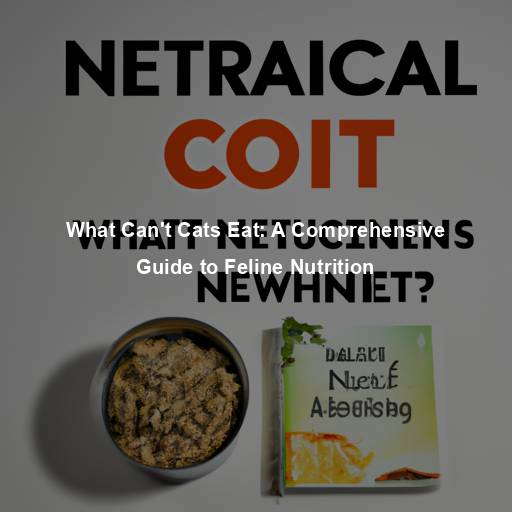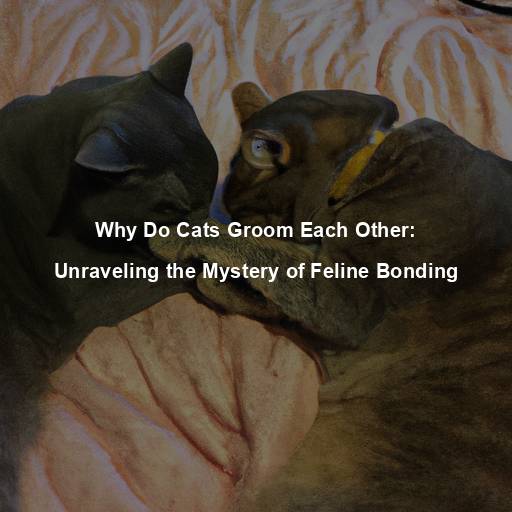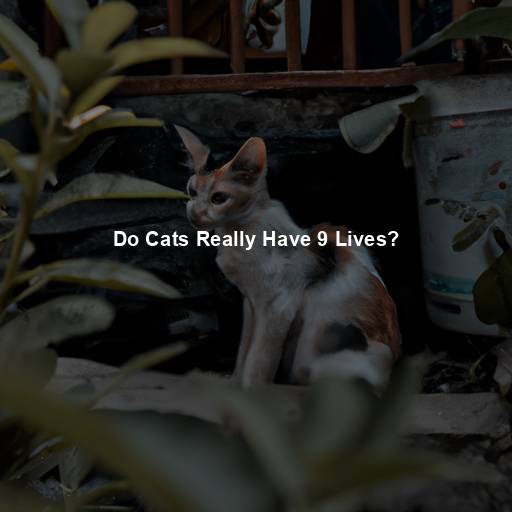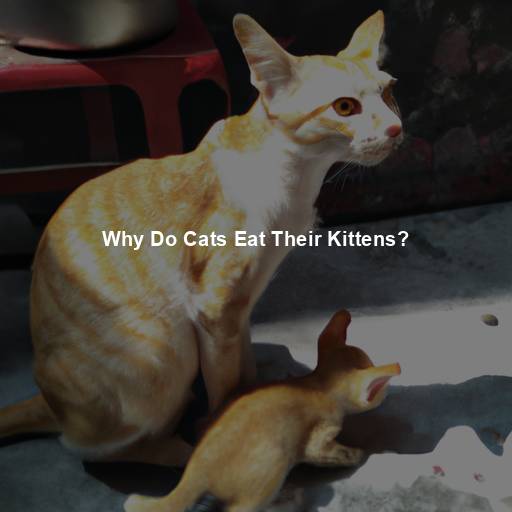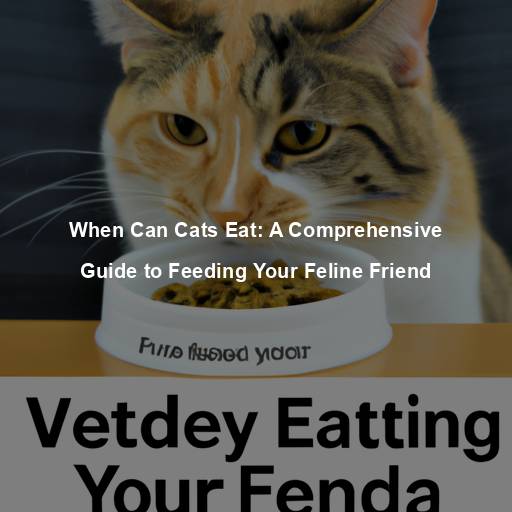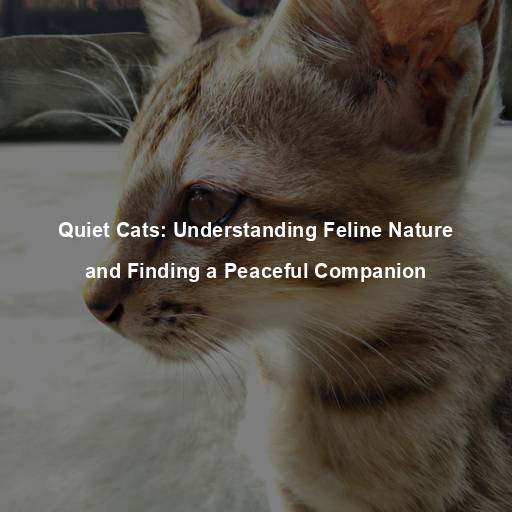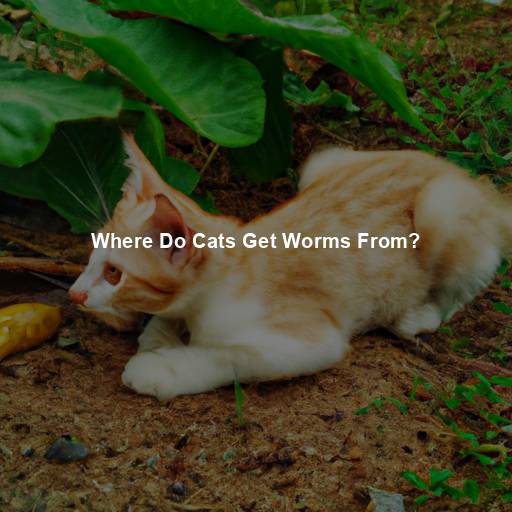What Can’t Cats Eat: A Comprehensive Guide to Feline Nutrition
Last Updated on July 27, 2023 by Evan
Contents [hide]
- 1 Understanding the Feline Diet: Exploring the Do’s and Don’ts
- 1.1 The Delicate Digestive System of Cats
- 1.2 Foods to Avoid: The Forbidden List
- 1.3 Understanding the Risks: Why These Foods are Harmful
- 1.4 Providing a Balanced Diet: Meeting a Cat’s Nutritional Needs
- 1.5 The Importance of Veterinary Guidance
- 1.6 Dairy Products: Myth vs. Reality
- 1.7 The Hidden Dangers of Onions and Garlic
- 1.8 The Bitter Truth About Chocolate
- 1.9 Grapes and Raisins: A Sweet Poison
- 1.10 The Perils of Caffeine
- 1.11 Alcohol: A Toxic Brew
- 1.12 Raw Meat and Fish: A Recipe for Trouble
- 1.13 Bones and Fat Trimmings: Hazards Lurking in the Kitchen
- 2 Consulting a Professional: The Role of Veterinarians and Nutritionists
- 3 FAQs: What Can’t Cats Eat
- 3.1 What are some common human foods that cats should avoid?
- 3.2 Can cats eat dairy products?
- 3.3 Are there any specific fruits or vegetables that cats should avoid?
- 3.4 Can cats eat raw fish or meat?
- 3.5 Is it safe for cats to consume dog food?
- 3.6 Can cats eat small amounts of cooked bones?
- 3.7 Are there any plants that are poisonous to cats?
- 3.8 What should I do if my cat accidentally ingests something harmful?
Understanding the Feline Diet: Exploring the Do’s and Don’ts
Cats are fascinating creatures known for their independence, agility, and mysterious nature. As responsible pet owners, it is our duty to ensure that our feline friends receive the best possible care, including a healthy and balanced diet. While cats are known to be obligate carnivores, there are certain foods that they should avoid consuming. In this comprehensive guide, we will explore the foods that are potentially harmful to cats and provide valuable insights into their nutritional needs.
The Delicate Digestive System of Cats
Before delving into the specifics of what cats can’t eat, it is essential to understand the unique aspects of their digestive system. Cats have a relatively short digestive tract, optimized for processing animal protein. Their bodies lack certain enzymes necessary for breaking down and metabolizing certain food components effectively. Thus, the feline digestive system is not equipped to handle certain foods that are safe for humans or other animals.
Foods to Avoid: The Forbidden List
While cats are known to be curious and may attempt to sample various human foods, it is crucial to be aware of the potential risks associated with certain items. Here is a comprehensive list of foods that should never be given to cats:
Did you know that onions and garlic, those staple ingredients found in nearly every kitchen, could actually pose a serious threat to your furry feline friends? It’s no joke – consuming these seemingly innocent ingredients, be it in their raw, cooked, or powdered forms, can unleash compounds that wreak havoc on your cat’s red blood cells, potentially triggering dangerous anemia. So, the next time you’re preparing a meal, make sure to keep these aromatic bulbs well out of your cat’s curious reach. After all, it’s better to be safe than sorry!
Did you know that chocolate can have serious consequences for our feline friends? It turns out that cats are unable to properly process theobromine, a stimulating compound found in chocolate. As a result, indulging in this sweet treat can leave our furry companions experiencing a rapid heartbeat, trembling, and in severe cases, even seizures. So, the next time you’re enjoying a delectable chocolate bar, remember to keep it out of reach from your curious kitties!
Attention cat owners: A seemingly harmless snack for us humans, grapes and raisins, can spell disaster for our feline friends. Surprisingly, even the tiniest nibble can wreak havoc on their delicate kidneys, leading to potential failure. Stay vigilant and keep these unsuspecting dangers far out of reach from your beloved furry companions.
- Caffeine: Beverages such as coffee, tea, or energy drinks should never be given to cats due to their high caffeine content. Caffeine can cause restlessness, rapid breathing, heart palpitations, muscle tremors, and even death in extreme cases.
When it comes to our feline friends, it’s crucial to understand that alcohol is absolutely off-limits. This substance, in any shape or form, can have detrimental effects on their delicate bodies, wreaking havoc on their liver and brain. Even the tiniest drop can lead to irreversible damage, highlighting the importance of keeping our beloved cats far away from this toxic liquid.
-
Raw Meat and Fish: While cats are carnivorous, raw meat and fish can contain harmful bacteria such as Salmonella or E. coli, which may lead to food poisoning or other gastrointestinal issues.
-
Dairy Products: Contrary to popular belief, most cats are lactose intolerant. Feeding them milk or other dairy products can result in digestive upset, including diarrhea and vomiting.
-
Bones and Fat Trimmings: Cooked bones can splinter and cause internal injuries, while fat trimmings can lead to pancreatitis. It is best to avoid feeding cats any form of bones or fatty scraps.
Understanding the Risks: Why These Foods are Harmful
When it comes to our feline friends, there exists a wide array of seemingly harmless food items that can actually be quite detrimental to their well-being. Delving into the intricacies of this forbidden list reveals a perplexing landscape of potential dangers. By unraveling the unique threats posed by each item, we can gain a deeper understanding of why these foods should absolutely be kept far away from our beloved cats.
- Toxic Substances: Onions, garlic, chocolate, and caffeine all contain substances that are toxic to cats. These substances can interfere with normal bodily functions, leading to serious health issues.
Attention Cat Owners: A Startling Revelation about Grapes and Raisins: A Perplexing Culprit in Kidney Failure. Prepare to be shocked as we unveil the hidden dangers lurking in your kitchen that could spell irreversible kidney damage for your feline companions. Brace yourself for an unforeseen twist: a mere handful of grapes or raisins can have devastating consequences, sending shivers down the spines of even the most prepared pet owners.
It’s a curious and perplexing fact that when it comes to our feline friends, their bodies function in a remarkably unique way. Take, for instance, the intriguing case of metabolic incompatibility. You might be surprised to learn that alcohol, raw meat, and fish have a complex relationship with our furry companions. Due to a lack of specific enzymes needed for processing, these substances can cause a whirlwind of mischief in their delicate digestive systems, potentially leading to toxicity or digestive disturbances.
Have you ever wondered why your feline friend struggles to handle dairy products? It turns out that cats lack an essential enzyme called lactase, the magical component that helps break down lactose. Without lactase, indulging in dairy can lead to a wild rollercoaster of digestive upset for our feline companions, featuring stomach-churning bouts of diarrhea, unwelcome episodes of vomiting, and discomforting abdominal pain.
When enjoying a delicious meal, it’s important to be mindful of the potential risks that certain food items can pose. Take, for instance, cooked bones – they might seem harmless, but they can actually splinter and become a choking hazard. Similarly, fat trimmings might tempt your taste buds, but indulging in excessive amounts can potentially lead to pancreatitis, a serious and painful condition. So, as you savor your culinary experiences, remember to tread carefully and prioritize your well-being.
Providing a Balanced Diet: Meeting a Cat’s Nutritional Needs
Now that we understand what cats can’t eat, it is essential to focus on their specific dietary requirements. Cats are obligate carnivores, which means their bodies require a diet rich in animal-based protein to thrive. Feeding them a balanced and nutritionally complete diet is crucial for their overall health and wellbeing.
-
High-Quality Commercial Cat Food: Opt for high-quality commercial cat food that is specifically formulated to meet a cat’s nutritional needs. Look for products that list animal protein as the primary ingredient and contain essential nutrients such as taurine, omega-3 fatty acids, and vitamins.
-
Avoid Homemade Diets: While some pet owners prefer to prepare homemade diets, it is crucial to consult with a veterinarian or a board-certified veterinary nutritionist to ensure the diet meets all of the cat’s nutritional requirements. Homemade diets may lack essential nutrients or contain harmful ingredients.
Indulging your feline friend with tantalizing treats can foster a stronger connection and promote a sense of amusement. Nevertheless, it’s crucial to exercise the art of moderation when dishing out these delectable surprises and opt for treats tailored explicitly for our purring companions. Refrain from sharing your own edible delights as a gesture of love, as this tempting act may throw their carefully orchestrated dietary equilibrium into disarray.
The Importance of Veterinary Guidance
When it comes to ensuring the overall health and wellbeing of our feline companions, seeking veterinary guidance is of utmost importance. A veterinarian can provide personalized advice based on your cat’s age, breed, health condition, and dietary needs. Regular veterinary check-ups, along with open communication, will help you make informed decisions regarding your cat’s diet and nutrition.
Dairy Products: Myth vs. Reality
It’s a common misconception that cats have a special affinity for milk. In reality, most cats are lactose intolerant, lacking the essential enzyme needed to break down the sugar found in dairy products. While they may relish the occasional taste, giving cats milk can often result in unpleasant digestive issues like diarrhea and vomiting. To ensure their well-being, it’s wise to steer clear of offering them these tempting treats altogether.
The Hidden Dangers of Onions and Garlic
When it comes to our feline friends, some foods can be a bit of a puzzle. Onions and garlic, in their various forms, can actually be quite perplexing for cats. These seemingly innocent ingredients harbor compounds that can burst the bubble of a healthy feline. They have the potential to harm our furry companions’ red blood cells, potentially causing a condition known as anemia.
The Bitter Truth About Chocolate
While chocolate may be a decadent treat for humans, it poses a serious risk to cats. Chocolate contains a stimulant called theobromine, which cats are unable to metabolize effectively. Ingesting chocolate can lead to symptoms such as increased heart rate, tremors, and even seizures. It is crucial to keep all chocolate products out of your cat’s reach and seek immediate veterinary attention if you suspect they have consumed any.
Grapes and Raisins: A Sweet Poison
Grapes and raisins, although healthy for humans, are highly toxic to cats. The exact compound responsible for their toxicity is still unknown, but even small amounts can cause kidney failure in cats. It is best to keep grapes and raisins out of your cat’s environment and be cautious when offering any foods that may contain them as ingredients.
The Perils of Caffeine
Beverages such as coffee, tea, energy drinks, and even certain medications contain caffeine, a stimulant that can have serious effects on cats. Cats are particularly sensitive to the effects of caffeine due to their smaller size and inability to metabolize it efficiently. Ingesting caffeine can cause restlessness, rapid breathing, heart palpitations, muscle tremors, and even death in extreme cases. It is crucial to keep all caffeine-containing products securely stored away from your curious feline.
Alcohol: A Toxic Brew
It’s a known fact that cats and alcohol don’t mix well. It’s not just a matter of a little sip causing a bit of discomfort – no, we’re talking about serious health implications here. Cats simply aren’t equipped with the right biological tools to handle alcohol, leaving them vulnerable to some grave repercussions for their precious little bodies. So, whether it’s a fancy cocktail or a humble bottle of beer, one thing is clear: keep it away from your feline friend at all costs.
Raw Meat and Fish: A Recipe for Trouble
Feeding cats raw meat or fish, although they have a natural inclination towards hunting and devouring their prey, can introduce some perplexing risks. Raw meat and fish occasionally harbor unwelcome bacteria, like Salmonella or E. coli, which can potentially incite food poisoning or trigger a medley of gastrointestinal afflictions in our feline friends. To mitigate these bewildering threats, it is suggested to diligently cook all meat and fish, leaving no mystery behind, before offering them to your whiskered companion to guarantee their well-being.
Bones and Fat Trimmings: Hazards Lurking in the Kitchen
While we cherish the precious company of our feline companions, it’s crucial to be aware of the hidden dangers lurking in certain culinary delights. Cooked bones, whether from the humble chicken or the majestic fish, may seem innocent enough, but they can play a sinister role in your cat’s safety. These seemingly harmless bones have the audacity to splinter when chewed, posing a perplexing choking hazard that nobody could have foreseen. As if that weren’t enough, fragmented bones have the potential to inflict internal injuries, a ghastly scenario featuring punctures and blockages in your cat’s delicate digestive tract.
Consulting a Professional: The Role of Veterinarians and Nutritionists
When it comes to ensuring the health and wellbeing of our feline companions, seeking professional guidance is paramount. Veterinarians and board-certified veterinary nutritionists are invaluable resources when it comes to understanding and meeting a cat’s nutritional needs. They can provide personalized advice based on factors such as your cat’s age, breed, health condition, and dietary requirements. Regular check-ups and open communication with these professionals will help you make informed decisions regarding your cat’s diet and overall care.
FAQs: What Can’t Cats Eat
What are some common human foods that cats should avoid?
It’s no secret that our feline companions have unique dietary needs, but did you know that there are certain human foods that can send their whiskers straight into a tizzy? From the rich allure of chocolate to the stimulating embrace of caffeine, these tantalizing delights may be harmless to us, but for our four-legged friends, they can be a recipe for disaster. Onions and garlic may add a flavorful kick to our meals, but for cats, these savory ingredients can provoke an intricate dance of perplexity within their delicate systems. Even alcohol, grapes, raisins, and the cunning xylitol lurking in unsuspecting products can unleash a wicked storm upon our precious furballs, causing ailments that range from puzzling health issues to downright fatal consequences. Thus, it is absolutely crucial, dear fellow cat guardians, to safeguard our furry companions from these culinary culprits and ensure their well-being is preserved for the many adventures that lie ahead.
Can cats eat dairy products?
Contrary to popular belief, cats and dairy products are not a match made in heaven. Let’s debunk the myth that felines can happily lap up milk and nibble on cheese. The truth is, most cats are lactose intolerant, meaning their digestive systems aren’t equipped to handle dairy. For our furry friends’ well-being, it’s wise to opt for cat-specific milk or seek advice from your trusted veterinarian for dairy substitutes. So, hold off the milk saucers and cheese plates, and keep your kitty’s tummy purring contentedly.
Are there any specific fruits or vegetables that cats should avoid?
Yes, some fruits and vegetables should be avoided or offered in moderation to cats. Onions and garlic should never be fed to cats, as they can damage their red blood cells. Avocado and grapes/raisins are also toxic to cats and should be kept away from them. While some cats may enjoy fruits like bananas or melons, these should be given in small amounts as occasional treats due to their high sugar content.
Can cats eat raw fish or meat?
Although cats are carnivores, it is generally not recommended to feed them raw fish or meat. Raw fish can contain harmful parasites and bacteria, such as salmonella or listeria, which can cause severe health issues in cats. Additionally, raw meat may not provide all the necessary nutrients and could be contaminated. It is safer to feed cats commercially prepared cat food or consult with your veterinarian for appropriate cooked meat options.
Is it safe for cats to consume dog food?
When it comes to our feline friends, their dietary needs are a world apart from their canine counterparts. It’s a no-go to regularly serve up dog food to kitties, as it simply doesn’t fulfill their essential dietary requirements. Taurine, vitamin A, and arachidonic acid are among the vital nutrients that regrettably go amiss in dog food, leaving cats lacking in key nourishment. Opting for specially formulated cat food is the wisest choice, ensuring that our beloved felines receive the precise nutrition their mysterious bodies demand.
Can cats eat small amounts of cooked bones?
No, cats should never consume cooked bones. Cooked bones become brittle and are prone to splintering, which can lead to severe injuries in a cat’s digestive tract. Ingesting bones can cause choking, internal obstructions, lacerations, or perforations. If you want to offer your cat a bone to chew on, make sure it is specifically designed for cats and is raw or specially prepared to be safe to consume.
Are there any plants that are poisonous to cats?
It’s a jungle out there, even in the comfort of our own homes, as some seemingly innocent plants can pose a serious threat to our feline friends. From the enchanting lilies to the vibrant azaleas, there’s a sinister side to these botanical beauties as they contain toxic substances that can wreak havoc on our cat companions. Beware of the tulips that tempt with their delicate petals, the captivating chrysanthemums, and those deceptively delicate ferns – they all hold the potential to unleash a wave of misery upon our furry friends.
The consequences of a curious nibble can vary from distressing but relatively minor symptoms like vomiting and diarrhea, to more severe issues such as loss of appetite and potential organ failure. It is our responsibility as cat guardians to create a haven devoid of such hazards, removing or securely placing any potentially harmful plants out of our cats’ reach. If, despite our vigilance, we suspect that our beloved feline has partaken in a toxic feast, it is imperative to seek immediate veterinary assistance. Remember, prevention is the key to a safe and happy environment for our precious feline companions.
What should I do if my cat accidentally ingests something harmful?
When it comes to our feline friends, safety is paramount. If you find yourself in the unsettling situation where your precious cat has, perhaps against their own better judgment, ingested something toxic, it is imperative to get in touch with your trusty veterinarian without an ounce of delay. Armed with the relevant details about the substance in question and any packaging that accompanied it, your vet will be able to provide tailored guidance and navigate this perplexing predicament with you. Swift action will safeguard your cat from potential complications and position them on the path to a triumphant recovery.

